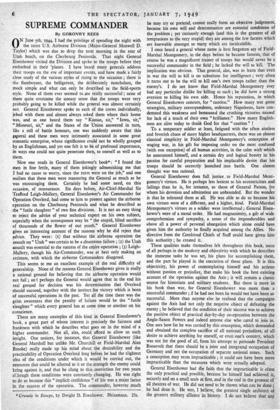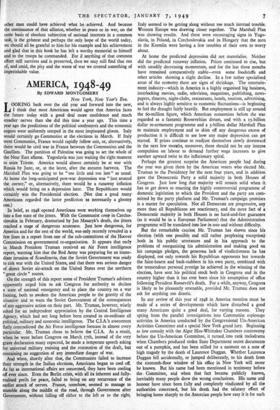SUPREME COMMANDER
By GORONWY REES
ON June 5th, 1944, I had the privilege of spending the night with the totst U.S. Airborne Division (Major-General Maxwell D. Taylor) which was due to drop the next morning in the rear of Utah beach, on the Cherbourg Peninsula. That night General Eisenhower visited the Division and spoke to the troops before they embarked in their 'planes. I have heard many generals address their troops on the eve of important events, and have made a fairly close study of the various styles of rising to the occasion ; there is the flamboyant, the belligerent, the deliberately nonchalant, the mock simple and what can only be described as the field-sports style. None of them ever seemed to _me really successful ; none of than quite overcame the uneasy sense that the troops were very probably going to be killed while the general was almost certainly not. General Eisenhower spoke to each of the crews individually, joked with them and almost always asked them where their home was, and as one heard them say " Kansas, sir," " Iowa, sir," "Missouri, sir," and the States of the Union answered in turn, like a roll of battle honours, one was suddenly aware that this Kneral and these men were intimately associated in some great romantic enterprise, whose significance could not be wholly grasped by an Englishman, and yet one felt it to be of profound importance, in ways one could not quite penetrate then, to oneself as well as to them..
Now one reads in General Eisenhower's book*: " I found the men in fine fettle, many of them jokingly admonishing me that I had no cause to worry, since the joist were on the job," and one realises that these men were reassuring the General as much as he was encouraging them. Certainly he had some need, on this occasion, of reassurance. Six days before, Air-Chief-Marshal Sir Trafford Leigh-Mallory, General Eisenhower's Air Commander for Operation Overlord, had come to him to protest against the airborne operation on the Cherbourg Peninsula and what he described as the " futile slaughter " of two fine divisions. It is not an easy thing to reject the advice of your technical expert on his own subject, especially when the consequence may be " the stupid, blind sacrifice of thousands of the flower of our youth." General Eisenhower gives an interesting account of the reasons why he did reject that advice. They were : (r) that without the airborne operation the assault on " Utah " was certain to be a disastrous failure ; (2) the Utah assault was essential to the success of the entire operation ; (3) Leigh- Mallory, though his Air-Commander, was at best only making an estimate, with which the airborne Commanders disagreed.
This seems to me an excellent example of the real difficulty of generalship. None of the reasons General Eisenhower gives is really a rational ground for believing that the airborne operation would not fail ; an-I perhaps the General would agree that in the end his real ground for decision was his determination that Overlord should succeed, together with the instinct for victory which is born of successful operations in the past. Yet all the time there was the grim awareness that the penalty of failure would be the " futile slaughter " which every general has at some time or another on his conscience.
There are many examples of this kind in General Eisenhower's book, a great part of whose interest is precisely the fairness and frankness with which he describes what goes on in the mind of a higher commander. Not all, alas, could afford to allow us such insight. One notices, for instance, that General Eisenhower (like General Marshall but unlike Mr. Churchill or Field-Marshal Alan Brooke) really made up his mind about the desirability and the practicability of Operation Overlord long before he had the slightest idea of the conditions under which it would be carried out, the TCSOUICeS that could be allotted to it or the strength the enemy could bring against it, and that he clung to this conviction for two years al:hough these conditions were constantly changing. He was right to do so because this " implicit confidence " of his was a major factor in the success of the operation. The commander, however much * Crusade in Europe, by Dwight D. Eisenhower. Heinemann. 25s.
he may try or pretend, cannot really form an objective judgement, because his own will and determination are essential conditions of the problem ; yet curiously enough (and this is the greatest of all temptations to the very stupid) they are among the few factors which are knowable amongst so many which are incalculable.
I once heard a general whose name is best forgotten say of Field- Marshal Montgomery, in the days before he became famous, that of course he was a magnificent trainer of troops but would never be a successful commander in the field ; he lacked the will to kill. The implication was obvious. That general, alas, was to learn that even in war the will to kill is no substitute for intelligence ; very often it turns out to be the will to kill one's own troops rather than the enemy's. I do not know that Field-Marshal Montgomery ever had any particular dislike for killing as such ; he did have a strong aversion to killing his own side. Hence his reputation, in which General Eisenhower concurs, for " caution." How many war game strategists, military correspondents, sedentary Napoleons, have con- demned this weakness and bemoaned the crushing victories missed for lack of a touch of their own " brilliance." How many English- men are alive today to thank God for that " caution "
To a temporary soldier at least, fatigued with the often aimless and feverish chaos of many higher headquarters, there was an almost classical simplicity in Field-Marshal Montgomery's conception of waging war, in his gift for imposing order on the most confused (with one exception) of all human activities, in the calm with which he announced himself, and a certain dry and logical beauty in his passion for careful preparation and his implacable desire that his troops should be correctly launched into battle. One almost thought war was rational.
General Eisenhower does full justice. to Field-Marshal Mont- gomery's virtues. He is perhaps less lenient to his eccentricities and failings than he is, for instance, to those of General Patton, for whom his devotion and admiration are unbounded. But the wonder is that he tolerated them at all. He was able to do so because his own virtues were of a different, and a higher, kind. Field-Marshal Montgomery's virtues as a soldier were intellectual ; General Eisen- hower's were of a moral order. He had magnanimity, a gift of wide comprehension and sympathy, a sense of the imponderables and above all a power of personal abnegation which alone could have given him the authority he finally acquired among the Allies. No directive from the Combined Chiefs of Staff could have given him this authority ; he created it.
These qualities make themselves felt throughout this book, most of all perhaps in the modesty and objectivity with which he describes the immense tasks he was set, his plans for accomplishing them, and the part he played in the execution of those plans. It is this objectivity, his power of contemplating himself and his actions without passion or prejudice, that make his book the best existing account of the operation against the Axis ; it will remain a classic source for historians and military students. But there is more in his book than war, for General Eisenhower was more than a successful commander ; if he had not been he would not have been so successful. More than anyone else he realised that the campaigns against the Axis had not only the negative object of defeating the enemy ; he believed that the condition of their success was to achieve the positive object of practical day-by-day co-operation between the Anglo-Saxon Powers and indeed anyone else who cared to join in. One sees how fir he was carried by this conception, which demanded and obtained the complete sacrifice of all national prejudices, of all desire to achieve anything for oneself, or even one's country, which was not for the good of all, from his attempt to persuade President Roosevelt that there should be a joint and integrated occupation of Germany and not the occupation of separate national zones. Such a conception may seem impracticable ; it could not have been more impracticable than the measures which were actually adopted.
General Eisenhower had the faith that the impracticable is often the only practical and .possible, because he himself had achieved it, securely and on a small scale at first, and in the end in the greatest of all theatres of war. He did not need to be shown what can be done ; he had done it. He was, I believe, the greatest single architect of the greatest military alliance in history. I do not believe that any
other man could have achieved what he achieved. And because the continuance of that alliance, whether in peace or in war, on the same basis of absolute subjection of national interests in a common task, is the greatest and perhaps the only hope of the world today, we should all be grateful to him for his example and his achievement and glad that in this book he has left a worthy memorial to himself and to the troops he commanded. Igor if anything of that common effort still survives and is preserved, then we may still find that out of, and amid, the pity and the waste of war we created something of imperishable value.







































 Previous page
Previous page